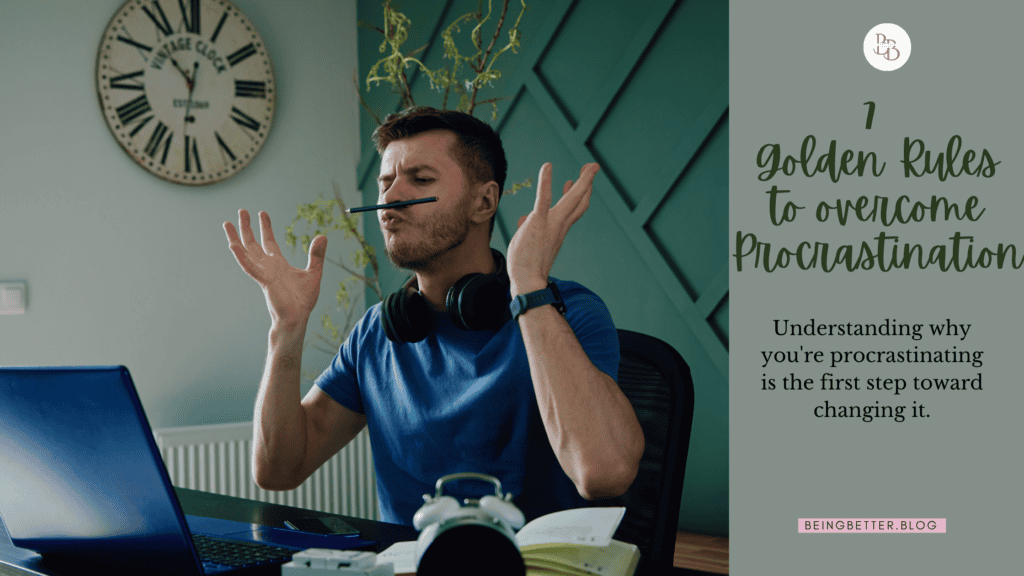Struggling with Procrastination?
Have you ever found yourself constantly putting things off, only to end up with regrets and disappointments? I’ve been there too. Procrastination used to be my biggest enemy, making life unnecessarily complicated. But as I embarked on a journey of mental health improvement and self-development, I realized the importance of staying organized and creating a stress-free, peaceful environment. These insights were key to tackling my procrastination habit.
Through trial and error—and with some inspiration from a mental health series—I discovered strategies that truly made a difference. I won’t claim to have completely defeated procrastination; it’s something I still occasionally struggle with. But now, I have the tools to fight it effectively. Today, I’m excited to share the tried-and-true tips that have helped me overcome procrastination and achieve my goals.
Table of Contents
Why Do We Procrastinate?
Before we jump into the tips, let’s take a moment to talk about why we procrastinate in the first place. Spoiler alert: it’s not because you’re lazy! Procrastination is often our brain’s way of protecting us from discomfort, kind of like a sneaky defense mechanism.
Here are some common (and totally normal) reasons we tend to put things off:
😨 Fear of Failing
Ever avoided a task because you were scared it wouldn’t turn out well? That’s fear of failure kicking in. You might think, “What if I mess this up?”—so you delay starting just to avoid that uncomfortable feeling.
🎯 Perfectionism
When you set super high standards for yourself, it can be hard to begin. If it can’t be perfect, you might not want to do it at all. But waiting for the “perfect moment” often just keeps you stuck.
😴 Lack of Interest or Motivation
Let’s be honest—some tasks just aren’t exciting. If something feels boring, pointless, or disconnected from your goals, it’s much harder to feel motivated to do it.
🧠 Feeling Overwhelmed
Big tasks can feel like mountains. When there’s too much to do or you don’t know where to start, your brain hits the brakes. So instead of starting, you scroll, snack, or nap.
Understanding why you’re procrastinating is the first step toward changing it. Once you know what’s holding you back, you can start choosing strategies that actually work for you.
1. Break Big Tasks into Bite-Sized Pieces
Let’s be honest—facing a big task can feel like standing at the base of a mountain with no clue how to start climbing. That’s exactly why many of us procrastinate. The task just feels too much. But here’s the trick: instead of tackling it all at once, break it down into smaller, more doable pieces.
How to Put This Into Practice:
- First, pick one big task you’ve been avoiding (you know the one 😉).
- Next, break it down into tiny, actionable steps. For example, instead of just saying “Write a report,” break it into things like:
- Research the topic
- Jot down key points
- Create an outline
- Write the introduction
- Draft each section
- Do final edits
- Now, focus on just one step at a time. That’s it. No pressure to do it all at once.
Each small win will make you feel more in control and actually build momentum. You’ll start to feel like, “Hey, I’ve got this!”
What I am doing is to keep a simple checklist for these kinds of tasks. Every time I finish one small step, I cross it off. It may sound basic, but trust me—it feels really satisfying. That little moment of accomplishment pushes me to keep going.
2. Try the Five-Minute Rule
Sometimes, the hardest part is just getting started. That’s where the Five-Minute Rule comes in—it’s a total game-changer for procrastinators. The idea is super simple: if something will take less than five minutes to do, just do it right away. No overthinking, no delay.
How to Put This Into Practice:
- Take a quick look at your to-do list or even your surroundings.
- Spot those super short tasks—maybe replying to a message, washing a couple of dishes, or putting away your shoes.
- Now, do one of them. Immediately.
You’ll be surprised how this tiny action can shift your mindset. Once you start, your brain kicks into “action mode,” and you might even keep going longer than five minutes without realizing it. It’s like giving your productivity a gentle nudge to get moving.
Also, think of it as a warm-up. It’s way easier to jump into bigger tasks once you’ve already checked off a few quick wins.
I now have a habit of using this rule throughout my day, especially when I catch myself staring at a task and thinking, “I’ll do it later.” If I realize it’ll only take a few minutes, I stop what I’m doing and just knock it out. It lightens my mental load and creates a nice ripple effect—suddenly, I’m in the flow and ready to take on more.
3. Set Clear Deadlines
Let’s face it—if we don’t give ourselves a when, we might never get to the what. That’s why deadlines are so powerful. They create a sense of urgency and give your brain a clear signal: “This needs to be done by this time.” No more floating tasks hanging around on your to-do list forever.
Why Deadlines Actually Work:
When you give a task a specific deadline, it becomes real. It goes from “I’ll do it someday” to “This is happening by Friday at 7 p.m.” That tiny shift can make a huge difference in your focus and follow-through.
How to Make This Work for You:
- Avoid vague goals like “I’ll organize my closet this week.” Instead, say “I’ll finish organizing the closet by Saturday evening.”
- For big projects, break them down and give each step its own mini deadline. It makes everything feel more doable.
- Put it in writing—use a calendar, planner, or app to make it official.
It’s not about putting pressure on yourself—it’s about giving your goals structure so they don’t get lost in the shuffle.
I rely on tools like Google Calendar to block out time and set deadlines for each step of a project. I also set gentle reminders so I don’t lose track of them. And here’s the mindset shift that helps me the most: I treat my deadlines like promises I’ve made to someone else. It gives me that extra push to follow through.
4. Remove Distractions
Let’s be real—distractions are sneaky. One minute you’re sitting down to get something done, and the next thing you know, you’re deep in YouTube Shorts or rearranging your entire kitchen shelf. (We’ve all been there.) The truth is, even small distractions can completely derail your focus and lead to major procrastination.
How to Create a Distraction-Free Zone:
- Start by noticing your personal distractions. What usually steals your attention? For me, it used to be endless scrolling through Facebook Reels and YouTube Shorts.
- Remove or reduce the temptation. Put your phone in another room to help limit screen time and keep you on track.
- Create a dedicated work spot. Having a clean, organized workspace—even if it’s just a corner of the room—can really shift your mindset into “focus mode.”
- Use helpful tools. Noise-canceling headphones, soft background music, or even a calming candle can help set the tone for deep focus.
The goal isn’t to be perfect—just set yourself up for fewer interruptions so your brain can stay in the flow.
One thing that’s worked wonders for me is the Pomodoro Technique—I work for 25 minutes, then take a short 5-minute break. It helps me stay focused without feeling drained. I set alarms or stick to strict time blocks so those 5-minute breaks don’t accidentally turn into a 45-minute scroll session.
5. Reward Yourself
Let’s be honest—doing hard things is easier when there’s something to look forward to at the end, right? That’s exactly why rewarding yourself works so well. It turns productivity into a positive experience instead of just a checklist of things you have to do.
When you associate finishing a task with a little treat or moment of joy, your brain starts to want to get things done. It builds a habit loop that says, “If I do this, something good happens.” That little burst of motivation? Super powerful.
How to Make Rewards Work for You:
- For small wins: Give yourself a tiny treat—maybe a favorite snack, a few minutes to scroll guilt-free, or a quick walk outside.
- For bigger tasks: Break the work into chunks and reward yourself after each milestone. Like, “Once I finish this section of the report, I’ll watch an episode of that show I love.”
- Keep it interesting: Change up your rewards so they feel fun and fresh. One day it might be a cozy cup of tea, another day a dance break to your favorite song.
The idea is to keep your energy up and make work feel a little more joyful.
I like to use rewards as little recharging moments between tasks. After finishing something that required real focus, I’ll step away, stretch, maybe treat myself to something small—it helps me reset and get ready for what’s next.
6. Visualize the Outcome
Sometimes, the hardest part isn’t the task itself—it’s just getting started. That’s where visualization can be a game-changer. When we take a moment to see the outcome/result in our mind, it can give us just the nudge we need to begin.
Why Visualization Works:
When you mentally picture the moment of completion—whether it’s the clean room, the submitted assignment, or the peaceful feeling after finishing your to-do list—it triggers positive emotions. That sense of relief, pride, or joy can help override procrastination and get you into action mode.
How to Practice This:
- Take 30 seconds to imagine what success looks like. Close your eyes and really picture it—how it feels, what it looks like, the weight lifted off your shoulders.
- Focus on the benefit, not just the task. Instead of dreading “cleaning the kitchen,” think about how peaceful and welcoming it’ll feel once it’s spotless.
- Make it part of your routine. Do a quick mental “preview” before starting any task, especially the ones you tend to put off.
It’s a simple mindset shift, but it can do wonders for our motivation. It helps us shift from “Ugh, I don’t want to do this” to “I can’t wait to feel that peace when it’s over.”
7. Be Kind to Yourself
We’re often our own worst critics—especially when we procrastinate. But here’s the truth- beating yourself up won’t help you move forward. What will help? A little kindness and self-compassion. Because progress comes from encouragement, not punishment.
Why It Matters:
When you’re stuck in a cycle of guilt or frustration, it becomes even harder to take action. But when you treat yourself with patience and understanding, you create a safe space to grow, improve, and move forward, without fear of failure.
How to Practice Self-Kindness:
- Catch your inner critic. Notice the harsh self-talk (“Why can’t I just do this already?”) and replace it with a gentler voice (“It’s okay, I’m trying. One small step at a time.”)
- Focus on progress, not perfection. Getting started, showing up, trying again—those are wins. Celebrate them.
- Reconnect with your “why.” Remind yourself of the purpose behind the task—whether it’s peace of mind, personal growth, or making life easier later.
Being kind doesn’t mean making excuses—it means giving yourself enough grace to keep going.
Whenever I catch myself spiraling into guilt over not being “productive enough,” I pause. I remind myself that it’s okay to move slowly as long as I’m still moving. I speak to myself the way I would to a friend: with encouragement, not judgment.
Additional Strategies to Consider
Practice Self-Compassion
Don’t beat yourself up for procrastinating. Acknowledge your feelings, but focus on taking small steps to improve.
Stay Organized
Use tools like planners, to-do lists, or productivity apps to keep track of your tasks and deadlines. Staying organized reduces mental clutter and helps you stay focused.
Build Healthy Habits
Good habits, like regular exercise, sufficient sleep, and a balanced diet, can improve your overall energy and focus, making it easier to stay productive.
That’s it, beauties! These golden rules—along with some bonus tips—have been game-changers for me in overcoming procrastination. Remember, making a change doesn’t have to be overwhelming. Start small, stay consistent, and celebrate every little win along the way. You’ve got this!
What are your go-to tips for beating procrastination? Share them in the comments below—I’d love to hear from you!



